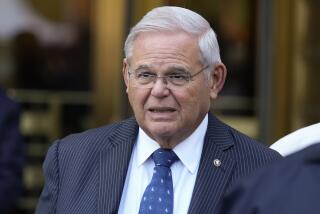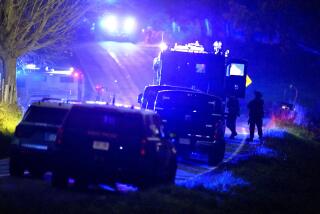Death Toll Rises to 10 in Blast at U.S. Consulate in Pakistan
KARACHI, Pakistan -- The death toll climbed to at least 10 people late Friday following a midmorning car bombing outside the U.S. Consulate here. Police cordoned off a large area and began combing the carnage and debris for clues to the blast, which left 51 others injured and Pakistan’s largest city bleeding from yet another terrorist atrocity.
None of the dead were Americans, and only six of the wounded were inside the consulate compound when the blast occurred.
One Pakistani police officer on guard outside the consulate was among the dead, but many of those killed were simply pedestrians or people in vehicles who happened to be in the area at the time of the explosion.
A statement issued by the U.S. Embassy in Islamabad, the capital, said five Pakistani consular employees and a U.S. Marine guard were slightly wounded by flying debris.
Suspicion for the attack immediately fell on Islamic militants who are known to be active in Karachi.
A local English-language newspaper, the News, received a fax late Friday purportedly from an unknown group calling itself Al Qanoon--”the Law”--claiming that it had carried out the bombing. Police said they were attempting to determine the statement’s credibility. The fax, which was handwritten in the local Urdu language, declared that the attack was the beginning of the group’s holy war in Pakistan.
“America, its allies and its lackey Pakistani rulers should be prepared for more bomb attacks in the future,” the note declared.
Religious extremist groups in this South Asian nation view as their enemy not just the United States but also Pakistani President Pervez Musharraf and his military government, which this year launched a major crackdown against them.
“We’re passing through very difficult times,” said Maj. Gen. Rashid Qureshi, the Pakistani president’s spokesman. “The task now is to keep our nerve and defeat these terrorists.”
In Houston, President Bush condemned the bombing.
“We fight an enemy that are radical killers, that’s what they are. You know, they claim they’re religious people, and they blow up Muslims. They have no regard for individual life,” he said during a brief visit to the Assn. for the Advancement of Mexican Americans summer camp.
“But these people, if they think they’re going to intimidate the United States, they do not understand the United States of America,” he said. “And we will continue to hunt them down and seek justice.”
In Washington, the State Department said the U.S. Embassy in Islamabad and consulates in the cities of Lahore and Peshawar, as well as the one in Karachi, would be closed temporarily for an emergency review of security procedures. Britain and the U.S. called on their nationals to leave the country, as they have done in recent weeks amid fears of increased terrorism and the threat of war between India and Pakistan.
The U.S. also pledged to work “shoulder to shoulder” with Musharraf and his nation to investigate the bombing and to continue the broader war against terrorism.
“We will continue this close cooperation. We are working with the government of Pakistan in its efforts to establish the identity of the perpetrators and bring them to justice swiftly,” State Department spokesman Philip T. Reeker said in a statement.
A large squad of FBI agents from Los Angeles was dispatched to Karachi to assist the bombing investigation and determine whether it might be a precursor to future terrorist attacks.
Just hours after the bombing, members of a so-called Rapid Deployment Team were notified that they would be sent to Pakistan. The team is one of only three in the U.S. and includes scores of FBI personnel--from counter-terrorism specialists and SWAT team members to support staff workers--who are trained to respond anywhere in the world after terrorist attacks on American interests.
“We will be there to assist Pakistan authorities in their investigation of this incident,” said Los Angeles FBI spokesman Matthew McLaughlin. “And as is the case with any investigation of this nature, we will take it wherever it leads to see if it links to anything else.”
Friday’s blast was the third terrorist attack in as many months directed against foreigners in Pakistan and the second in little more than a month in Karachi. Another car bomb went off outside the Sheraton Hotel and Towers only a few hundred yards from the U.S. Consulate on May 8, killing 11 French defense contract workers in a bus that was to have taken them to work.
In March, an armed assault in Islamabad on a Protestant church where most of the worshipers were foreigners killed five people, including two Americans. Daniel Pearl, an American journalist with the Wall Street Journal, was kidnapped in late January in Karachi and later beheaded. The murder trial of a Muslim extremist accused of organizing the kidnapping is in progress.
Contrary to initial reports that Friday’s attack was carried out by a suicide bomber who rammed the consulate wall, witnesses said late Friday that traffic was moving normally along the busy divided road that runs next to the consulate when a vehicle detonated. The explosion occurred about 6 feet from the protective concrete wall that serves as the consulate’s outer perimeter.
Local law enforcement officials said they were ruling out nothing during the initial stages of the investigation, though there was little doubt that a bomb had caused the blast. While some talked of a suicide bomb, there was also speculation that the explosive could have been planted in a car and set off by remote control.
“We’re very early in our investigation, and we’re keeping our mind open until evidence leads us in a specific direction,” said Syed Kamal Shah, chief of police for Sindh province, which includes Karachi.
A small Suzuki commercial van was first believed to be the vehicle carrying the bomb, but attention later in the day focused also on a small Toyota sedan operated by a local driving school for women. Police said the car was known to make frequent trips by the consulate, which is located between the driving school and a local license testing center.
The car’s three occupants--two women, ages 20 and 19, and the 38-year-old school owner, Faruhanda Jabeen--were among those killed in the attack. Police said their bodies were blown apart.
Shah said investigators had yet to determine decisively which vehicle carried the bomb.
“Those two were the ones worst affected by the explosion,” he said. “We’re examining parts from both vehicles closely.”
The force of the blast was enormous.
It left a 3-foot-deep crater in the roadway, tore out a 25-foot section of the consulate’s protective wall and blew out windows of the facility and other buildings within a quarter-mile radius of the explosion. Auto parts, believed to have come from whichever vehicle contained the bomb, shot skyward before raining down over a park across from the consulate.
U.S. Consul General John K. Bauman, who lives beyond the park nearly a quarter of a mile from the consulate, said two tie rods from an automobile engine landed on his property. One hit the driveway, narrowly missing a gardener; the second landed on the roof. The street outside the consulate was strewn with debris and the wreckage of several vehicles.
Among the clutter was a single toddler-sized gray leather sandal, the fate of its owner unknown, although no children were believed to be among the dead.
Bauman, who was in the consulate at the time of the explosion, said the building “was rocking.”
Ironically, a counter-terrorism exercise had been planned for 11:30 a.m. at the consulate, about 20 minutes after the bombing.
*
Times staff writers Edwin Chen in Houston, Greg Krikorian in Los Angeles and Robin Wright in Washington contributed to this report.
More to Read
Start your day right
Sign up for Essential California for news, features and recommendations from the L.A. Times and beyond in your inbox six days a week.
You may occasionally receive promotional content from the Los Angeles Times.






